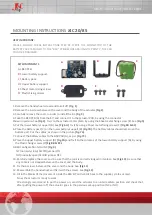MPC563XM Reference Manual, Rev. 1
928
Freescale Semiconductor
Preliminary—Subject to Change Without Notice
23.5.5
Estimating Worst Case Latency
Reliable systems are designed to work under worst-case conditions. This section explains how to estimate
worst-case latency (WCL) for any eTPU function in any system. The appendix covers the following topics:
•
Introduction to Worst-Case Latency
•
Using Worst-Case Latency Estimates to Evaluate Performance
•
Priority Scheme Details used in WCL Analyses
•
First-Pass WCL Analysis
•
Second-Pass WCL Analysis
The first-pass WCL analysis is based on a deterministic, generalized formula that is easy to apply. Because
of the generalizations in the formula, the first analysis result is almost always much worse than the real
worst case. If the desired system performance is within the limits of this first analysis, then no further
analysis is required; the system is well within the performance limits of the eTPU. If the desired system
performance exceeds that indicated by the first analysis, the second-pass WCL analysis should be applied.
The second-pass analysis is not a generalized formula, but rather uses specific system details for a realistic
worst-case estimation.
23.5.5.1
Introduction to Worst-Case Latency
NOTE
In this Appendix the latency calculation and examples refer to old TPU
functions such as PWM, DIO etc. These functions use single action
channels which have single transition and single match functionality. They
are not optimized for the eTPU hardware enhancement which support
various double action modes. These examples are for reference only. New
eTPU functions which are optimized for the new hardware will impose
different latency calculations.
Worst-case latency for a channel is the longest amount of time that can elapse between the execution of
any two function threads on that channel. For example, if in a particular system, channel 5 is running
PWM, the worst-case latency for channel 5 is the longest possible time between the execution of two PWM
threads. The worst case time includes the time the execution unit takes to execute threads for other active
channels, and other delays described later in this section. Refer to


















